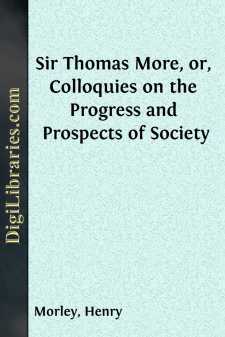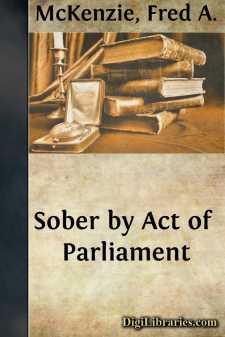Non-Classifiable
- Non-Classifiable 1768
Non-Classifiable Books
Sort by:
I. ON THE ART OF REYNOLDS The name of Sir Joshua Reynolds holds a place of honor among the world's great portrait painters. To appreciate fully his originative power one must understand the disadvantages under which he worked. His technical training was of the meagrest kind, and all his life he was hampered by ignorance of anatomy. But on the other hand he combined all those peculiar qualities of...
more...
by:
Alexander Whyte
APPRECIATION AND INTRODUCTION The Religio Medici is a universally recognised English classic. And the Urn-Burial, the Christian Morals, and the Letter to a Friend are all quite worthy to take their stand beside the Religio Medici. Sir Thomas Browne made several other contributions to English literature besides these masterpieces; but it is on the Religio Medici, and on what Sir Thomas himself calls...
more...
by:
Henry Morley
It was in 1824 that Robert Southey, then fifty years old, published “Sir Thomas More, or Colloquies on the Progress and Prospects of Society,” a book in two octavo volumes with plates illustrating lake scenery. There were later editions of the book in 1829, and in 1831, and there was an edition in one volume in 1837, at the beginning of the reign of Queen Victoria. These dialogues with a...
more...
Sir Walter Scott When I was asked to choose a subject for a lecture at the Sorbonne, there came into my mind somehow or other the incident of Scott's visit to Paris when he went to see Ivanhoe at the Odéon, and was amused to think how the story had travelled and made its fortune:— 'It was an opera, and, of course, the story sadly mangled and the dialogue in great part nonsense. Yet it was...
more...
by:
Anonymous
It is our design to present a pleasing and interesting miscellany, which will serve to beguile the leisure hour, and will at the same time couple instruction with amusement. We have used but little method in the arrangement: Choosing rather to furnish the reader with a rich profusion of and anecdotes, all tending to illustrate the FEMALE CHARACTER, to display its delicacy, its sweetness, its gentle...
more...
by:
Louise Brink
Sleep walking or night wandering, known also by its Latin name of noctambulism, is a well-known phenomenon. Somnambulism is not so good a term for it, since that signifies too many things. In sleep walking a person rises from his bed in the night, apparently asleep, walks around with closed or half opened eyes, but without perceiving anything, yet performs all sorts of apparently purposeful and often...
more...
by:
Fred A. McKenzie
CHAPTER I. THE STATE AS SALOON KEEPER. During the last few months South Carolina has been the scene of a remarkable experiment in liquor legislation, which has attracted considerable attention from social reformers everywhere. Though professedly based on the Gothenburg system, the Dispensaries Act differs from its prototype in many important respects. As in Sweden, the element of individual profit is...
more...
by:
Leslie Stephen
THE AIMS OF ETHICAL SOCIETIES. I am about to say a few words upon the aims of this society: and I should be sorry either to exaggerate or to depreciate our legitimate pretensions. It would be altogether impossible to speak too strongly of the importance of the great questions in which our membership of the society shows us to be interested. It would, I fear, be easy enough to make an over-estimate of...
more...
by:
John Spargo
INTRODUCTION It is not a long time since the kindest estimate of Socialism by the average man was that expressed by Ebenezer Elliott, "the Corn-Law Rhymer," in the once familiar cynical doggerel:—"What is a Socialist? One who is willingTo give up his penny and pocket your shilling."There was another view, brutally unjust and unkind, expressed in blood-curdling cartoons representing...
more...
INTRODUCTION It was about a decade ago that Professor E.R.A. Seligman of Columbia University published his valuable work on the "Economic Interpretation of History," which gave a great impetus to the study, by historians, of the economic influences upon political and social development. Professor Seligman showed conclusively that one of the most potent forces in the growth of civilization has...
more...











